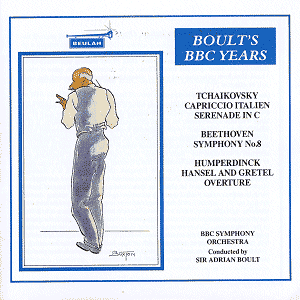BOULT'S BBC YEARS
TCHAIKOVSKY Capriccio
Italien
TCHAIKOVSKY Serenade for Strings
BEETHOVEN Symphony No.
8
HUMPERDINCK Hansel and Gretel
overture
 BBCSO/Boult
BBCSO/Boult
ADD Mono - rec Colston Hall, Bristol, 9 Apr 1940 (Capriccio); Abbey
Rd, 21 Jul 1932 (Beethoven); Abbey Rd, 25 June 1937 (Serenade); Abbey
Rd, 25 July 1932
(Hansel).
 BEULAH 1PD12
[74.19]
BEULAH 1PD12
[74.19]

Beulah have shown uncommon confidence in Boult in his early years. Their
catalogue is the home of many of his earliest recordings. The Boult known
to most of us now in our forties and fifties is the apparently starchy taciturn
Brit with the ramrod back and the bristling moustache who, in the 1960s and
1970s, trotted into the EMI studios to record British music - LP after LP.
As any history of the BBCSO will show, Boult was anything but an exclusive
specialist in native British music. He conducted all comers and especially
in the 1930s pioneered modern European scores quite freely. This disc reminds
us of the vintage commercial recordings he made of the core repertoire.
The Capriccio is a bombastic work which for all its brilliance is
pretty thin gruel. Boult however gives it one of its best ever outings. He
does this redeeming work through the minutest attention to phrasing, dynamics
and pacing. The first five minutes reveal parallels with the Sibelius of
Finlandia (Boult's 1960s Sibelius had the same granitic swing) and Symphony
No. 2 - the latter a work of Sibelius's Italian summers. The record surfaces
quietly burble, sizzle and crackle but major trauma damage has been removed.
The recording was made in Bristol in the early days of the war when the orchestra
had been evacuated for its own safety but before Bristol fell prey to some
of the most homicidal raids. The orchestra play with real engagement despite
the arduous conditions and worries of the time. They were soon to decamp
to Bedford and comparative safety.
Boult directs an alert and exciting performance of Beethoven 8 with many
of the same qualities as are in evidence in his contemporary recording of
Schubert's Great C major (also on Beulah and very recently released).
In fact, if you close your eyes for a moment, the stylistic relationship
with the Schubert is seamless. The Tchaikovsky Serenade, though done
with a lilt (II) and a sigh (III) and dating from 1937 during the orchestra's
vintage years, seems far from smooth and when it does acquire suaveness it
becomes a shade superficial. The Humperdinck takes us back to Abbey Road
four days after the Beethoven had been set down. It represents an orchestra
and conductor in good heart giving a flowing and playful performance.
Full notes by Bill and Gill Newman and, on the cover, a delightful drawing
of Boult rehearsing. Minimal engineering intervention is intended to preserve
the original sound uncompromised.
A souvenir of Boult the antithesis of the Karajan/Bernstein school; a man
with a subtle baton technique and no sense of podium balletics. Integrity
shines from these recordings reminding us of other dimensions to a man who
is and was so much more than the archetypal English gentleman.
These are, by the way, commercial recordings, not studio work for broadcast.
Rob Barnett
http://www.eavb.co.uk
beulah@enterprise.net

